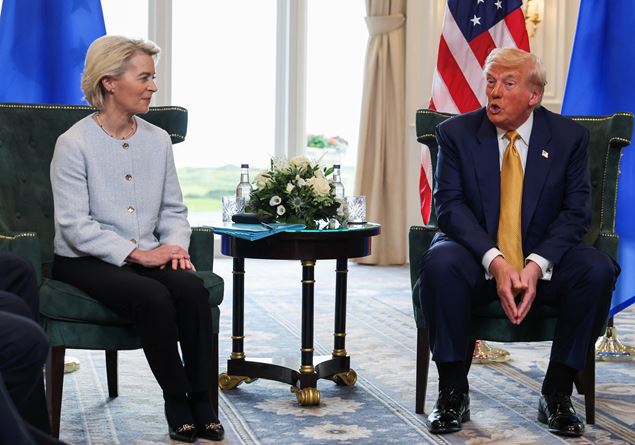There is an art that Donald Trump master as few: that of muscle negotiation, passed off for economic patriotism. In the golf course owned by Turnberry, on the Scottish coast, the best game played against Ursula von der Leyen. With his usual arrogant commercial tactic he had asked for 30 percent to have the 15th and in fact he obtained it, while the president of the Commission left on the table – on the lawn in this case – very heavy conditions. Among other things, the European Union will acquire $ 150 billion in energy from the United States, and will invest 600 billion dollars in the American partner in energy and military products.
Italy, as always in these great transatlantic maneuvers, finds itself counting damage to games done. According to Confartigianato there are 25,037 Italian companies that in the last three years have directly and permanently exported to the United States, with a total value of sales that has reached 56.4 billion euros in only 2024. On average, the US market represents 13.4% of the total exports of each exporting company. In particular, Confartigianato reports over 6,000 vulnerable Italian companies since they concentrate on the US market over 50% of their total exports, equal to 11.1 billion euros. There will be tears and screeching of teeth, with the risk of tens of thousands of lost jobs, because obviously you have to consider the chain effects on suppliers and all the fragile fabric of the SMEs.
But the worrying thing is not the acceptance of a “imbalance” in the rates: 15 percent on the goods of the Old Continent, from zero to 4.8 for American products, but what the Union has granted to Trump, the “gifts” offered to the court of the emperor to limit the damage. It is known that the American president is impatient with respect to international rules and he cares about the enormous conflicts of interest in which he himself is involved (for example on affected affairs on cryptocurrencies). The terms of the agreement are not clear (and perhaps they will never be) but what will it be European regulations on digital services and European cryptocurrencies, the micar, with enormous speculation risks of speculation?
Not to mention the web tax, the bill carried out laboriously forward in these years that aims, in the era of the digital economy, to the regulation of taxation for multinationals operating on the net, with the aim of guaranteeing tax equity and loyal competition. With a view to war on tax evasion, the Commission had already sanctioned the major global digital companies with the payment of billions of euros. These are the so -called Big Tech, almost all American, from Google to Meta, who in the past decades have enjoyed immense tax advantages by making business in Europe without paying a euro to the community. Their masters were all lined up at the Trump settlement speech, which widely perforated in the election campaign. And today they happily enjoy their support for The Donald. In fact, the Union does not take into consideration the idea of introducing a web tax. The “Big Tech” such as Google, Microsoft, Netflix produce a powerful positive balance in the exchanges with Europe in the services sector and therefore fall perfectly in the Trumpian protectionist logic. The union therefore wanted to clear the field from misunderstandings and offer the American president another scalp in this economic waterloo. There are those who say that after all it was the best thing to give Trump as a smoke in the eyes because it was only a project, however difficult to apply internationally. In reality, in the name of the commercial “de-Escalation”, Brussels gave up the blow on the front where he was timidly trying to build A European digital and tax sovereignty. It was a tiring and courageous precedent that would have been a tread in the world. And who risks shipwrecked miserably, after a thousand efforts, in a Scottish golf course.
Francesco Anfossi








